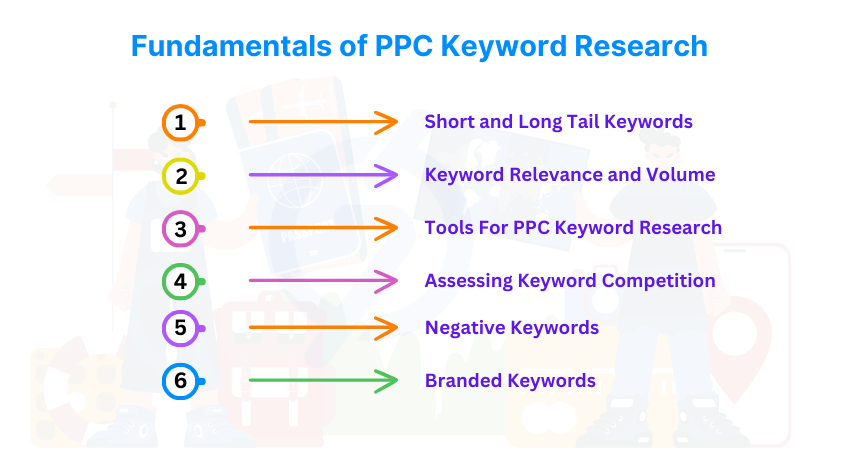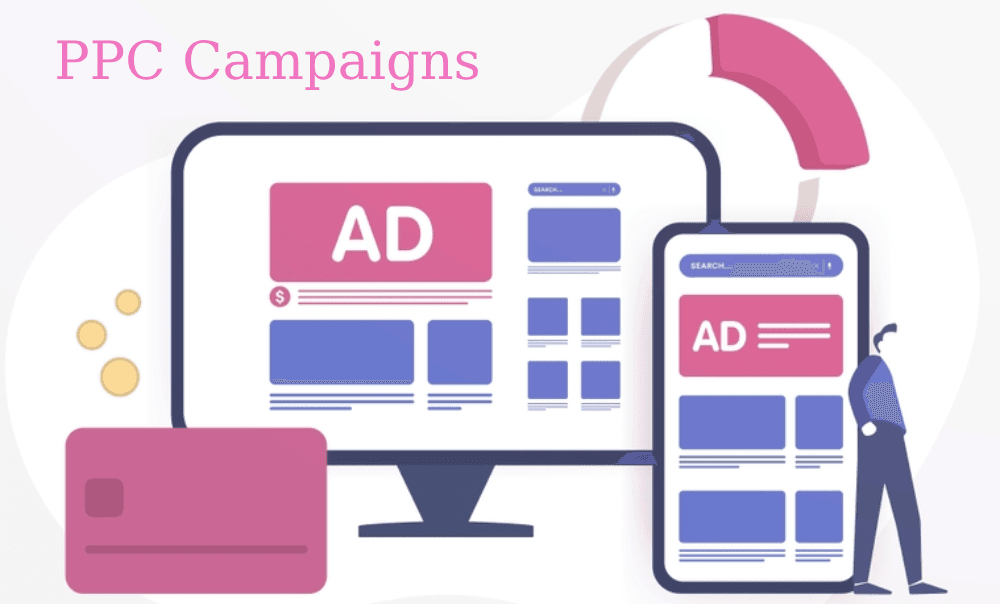When your trust is in PPC advertising for effective business promotion, keywords are the backbone of your PPC campaigns. Without the right keywords, even the most creative online ads can fall flat, wasting both time and money.
As a hardworking marketer, you don’t want this. But what if you could tap into a method that drives high-quality traffic directly to your business website? Yes, this will happen when you give time to proper keyword research.
It’s not just about picking popular words; it’s about choosing terms or phrases that your ideal audience uses to search for offerings related to yours. If you conduct proper research and develop a strategy, your ad will appear higher in relevant search results.
In this in-depth guide, we’ll walk you through the basics of keywords and the process of PPC keyword research, showing you how to identify the perfect keyword to maximize your ad performance.
PPC Keyword Research: Is It Worth Investing Time?
Suppose you go to a medical shop and ask for the best medicine for headaches. The shop owner understands your needs and presents you with several brand options. Now, it’s up to you to choose.
This is similar to how it works digitally, but instead of asking in person, you type your query using keywords, and search engines bring you relevant results. These results come from businesses that have focused on proper PPC keyword research and implemented those keywords in their PPC ad campaigns.
Is it worth investing time in proper keyword research? If the goal is simply to use keywords, you might think that applying common sense is enough. For example, you could use keywords like “Best Trip Organizer” in your PPC ad campaigns if your business falls under the travel and tourism industry. So, what’s the need for research?
Keyword research helps you understand how many users are searching for specific keywords, along with other related terms or phrases, and whether their search volume is low, medium, or high. With proper PPC keyword research, you can also generate new keyword ideas for your PPC ads, which might boost their performance.
Therefore, it’s definitely worth investing time in PPC keyword research.
The Fundamentals of PPC Keyword Research
Pay-per-click keyword research is a very important step for successful online advertising campaigns. It involves identifying the ideal keywords that potential customers use when searching for offerings you offer. Here’s a breakdown of the fundamentals:

Short and Long Tail Keywords
When you research keywords for your business, you will encounter both short-tail and long-tail keywords. Short-tail keywords are broad search terms that usually consist of one or two words, like “Shoes” or “Best Laptops.”
They have a high search volume but are more competitive. Long-tail keywords seem longer and more specific phrases, like “Best Running Shoes For Flat Feet.” They have a lower search volume because customers don’t have time to type long-tail keywords, but they can attract more targeted traffic, which often results in higher conversions.
Keyword Relevance and Volume
The word ‘Relevance’ might confuse you. Here, relevance means how closely a keyword matches what your target audience is searching for. Choosing the right keywords helps drive quality traffic to your business website.
Search volume indicates how often a PPC keyword is searched (weekly, monthly, or yearly). A proper balance is crucial; high-volume keywords can be competitive, while low-volume keywords may not generate sufficient traffic.
Tools For PPC Keyword Research
There are many tools available to find the appropriate keywords for your PPC ad campaigns. PPC keyword research tools like Google Keyword Planner, Keyworddit, SEMrush, and Ahrefs help identify the best keywords for your campaigns. These tools offer insights into the following:
- Search Volume
- Competition,
- Bids,
- Related Keywords Suggestions.
Assessing Keyword Competition
In this context, competition refers to how many other businesses are bidding on the same keywords. Analyzing the competition for keywords you plan to include in your PPC ads is one of the fundamentals of PPC keyword research.
High-competition keywords are harder and most expensive to rank for, but if you get a good grip on them, your PPC ad campaigns can deliver the desired results.
Negative Keywords
Negative keywords are negative not by nature but for your business. They are the terms that you don’t want your online ads to show for. By including negative keywords in your online ad campaigns, you can filter out irrelevant searches and avoid wasting money on clicks that aren’t likely to convert or are not the best audience for your business.
For example, if you sell premium shoes, you might exclude “cheap” as a negative keyword. This way, you can filter your audience who are looking for cheap shoes and attract those who are looking for premium ones.
Branded Keywords
Branded keywords are those keywords that include your company name or product name, like “7Search PPC.” These keywords are used to reach people who already know about your brand and are looking for your specific products and services.
For example, we have launched our affiliate program, and the branded keyword for this is ‘7Search PPC Affiliate Program.’ By including branded keywords in your ad campaigns, you can catch potential customers who are ready to buy.
It also helps ensure that your ad shows up when someone searches for your brand, preventing competitors from taking your spot in search results.
The Importance of PPC Keyword Research
Successful marketers who promote their businesses through PPC ad campaigns give enough time for in-depth keyword research. This is why they are successful, as it shows the importance of keyword research. Below are some key reasons why PPC keyword research is important:
Helps Target the Right Audience
Pay-per-click keyword research helps identify the terms your target audience uses when searching for offerings like yours. By giving enough time to research and select the right and related keywords for your business, you can ensure your PPC ads reach the people who are most likely to convert. This helps increase the relevance of your online ads and ensures you’re not wasting your advertising budget on irrelevant clicks.
Improves Ad Performance
Effective PPC keyword research allows you to choose high-performing keywords that attract and drive more traffic to your website. By targeting the right terms, your ads become more competitive.
When your ad becomes competitive, its chances of being shown to the right users increase. When your audience sees your ad prominently displayed while typing those keywords on search engines, you benefit from the following:
- Increased click-through rates (CTRs)
- High Conversions
- Optimized ad performance
Rapid Return on Investments
With proper PPC keyword research, you can focus on high-intent keywords that bring in more qualified leads. As we all know, new leads are like fuel for a business, and when they come in regularly, they help drive continuous and boost overall revenue.
This improves conversion rates and ensures you’re spending money on ads that lead to actual sales or inquiries. It helps make the most of your advertising budget, which leads to a higher return on investment.
Keeps You Ahead of Competitors
A good and strategic investment in PPC keyword research will never disappoint you. It gives you insights into the keywords your competitors are targeting.
By discovering your competitor’s keywords, you can adjust your own PPC strategy to target more profitable or less competitive keywords, gaining a competitive edge. This can help you to roar in search results, which means more traffic to your ads while reducing competition.
How to Perform Keyword Research for a Successful PPC Campaign
After reading this blog so far, we understand that in-depth PPC keyword research is a vital component of a successful PPC (Pay-Per-Click) campaign. Now, it’s time to learn the steps involved. Here’s a step-by-step guide on how to perform keyword research for a PPC campaign:

Which Category Does Your Business Fall Under? Find Out!
To start PPC keyword research for a PPC campaign, first figure out what type of business you have. Are you in E-commerce, IT services, iGaming, Healthcare, or another field? Finding out your business category helps you know who your target customers are and what they might be searching for.
For instance, an online shoe store could use keywords like “Buy Shoes Online,” while an iGaming business might use “Best Gambling Games.” This understanding helps you choose the right keywords that attract the right people to your business.
Make a Good Use of PPC Keyword Research Tools
You don’t need to wake up in the early morning and start finding keywords on an empty stomach. There are multiple PPC keyword research tools present in the market that are ready to help you by suggesting the most relevant keywords for your content.
You need to pick one of the best tools (paid and free) and use their services to make research on keywords easier and improve the reach of your online ads.
Filter Keywords by Analyzing Their Metrics
Once you have a list of keywords, look at their metrics to pick the best ones for your PPC campaigns. You must focus on keywords that have a lot of searches but low competition. This can help you spend less and get better results.
However, the decision to select the best keyword is entirely yours, as no one understands your campaign needs better than you. But before moving on to the process of analyzing and filtering keywords, you need to better understand your online advertising goals.
Focus on the User’s Intent
Understand why your audience is searching for certain keywords. Are they looking to buy something, get information, or compare choices? This is called user intent (informational, navigational, and transactional.) Choose keywords that match what your customers are trying to do.
For example, keywords can be informational (e.g., “how to choose shoes”), transactional (e.g., “buy running shoes online.”), or navigational (e.g., “Nike store near me.”).
Group Keywords into Ad Groups
Grouping your keywords into ad groups by themes or product types helps you create ads that are more focused and relevant. For example, if you sell different shoes, you can put keywords like “running shoes” and “sports shoes” together in one group and “formal shoes” in another. This makes your ads match what people are looking for and leads to more clicks and sales.
Conclusion
PPC keyword research is key to making your ad campaigns more successful. Choosing the right keywords, understanding what people are searching for, and using the right keyword research tools help you engage and reach the right audience, improve ad performance, and get the best return on investment.
Spending time researching the keywords helps you stay ahead of competitors and ensures your ads show up for the people most likely to take action. In the end, a well-planned PPC campaign can bring in high-quality traffic and help your business grow, so focus on that!
Frequently Asked Questions (FAQs)
What is PPC keyword research?
Ans. It is the process of identifying relevant keywords that ideal customers use to search for offerings like yours.
How can I find related keywords for my business?
Ans. You can use popular and effective tools like Google Keyword Planner, SEMrush, Ahrefs, or Keyworddit to find relevant keywords. These tools provide information on search volume, competition, and related keywords.
What is keyword relevance?
Ans. It refers to how closely a keyword matches the intent of a user’s search. Relevant keywords lead to higher-quality traffic.
How often should I update my keyword list?
Ans. It’s a good practice to review and update your keyword list regularly to run along with search trends and user behavior.
Can I use the same keywords for all my ad groups?
Ans. No, it’s better to group keywords into ad groups based on their relevance.


















